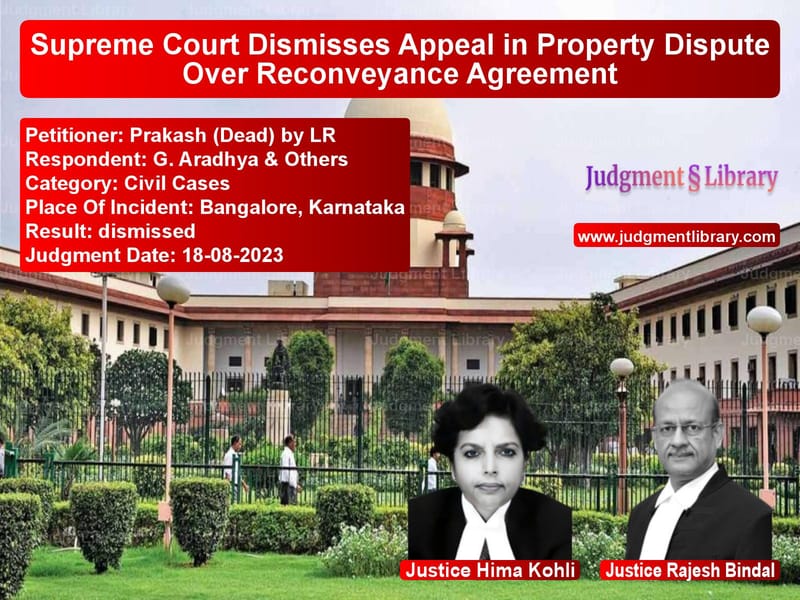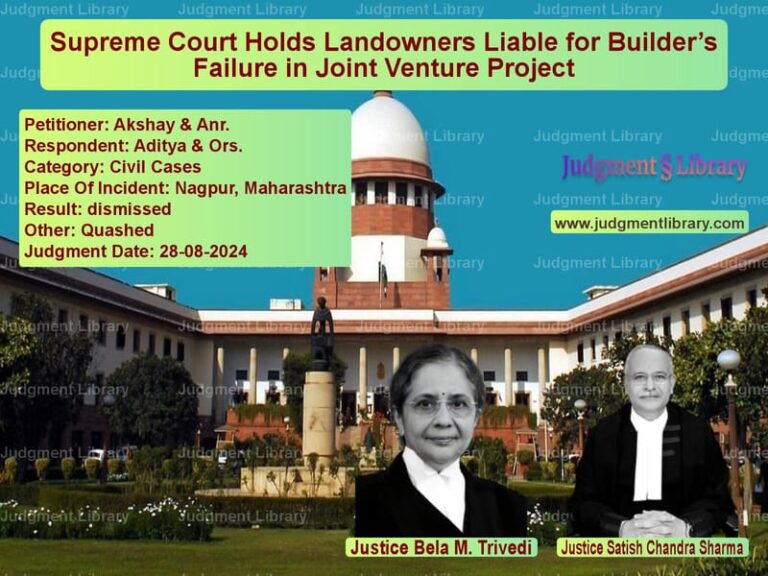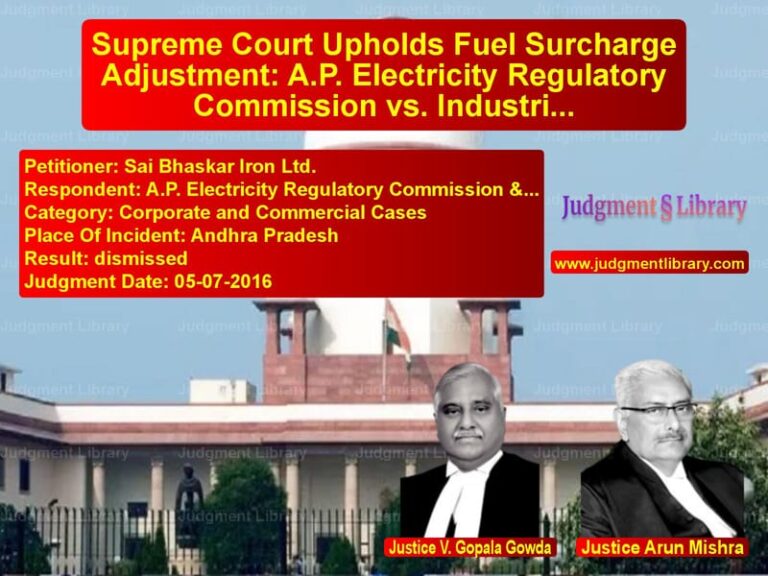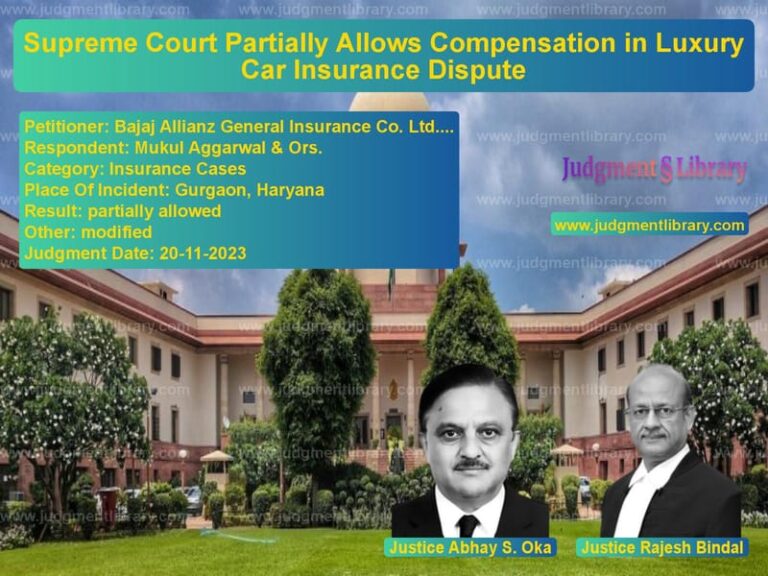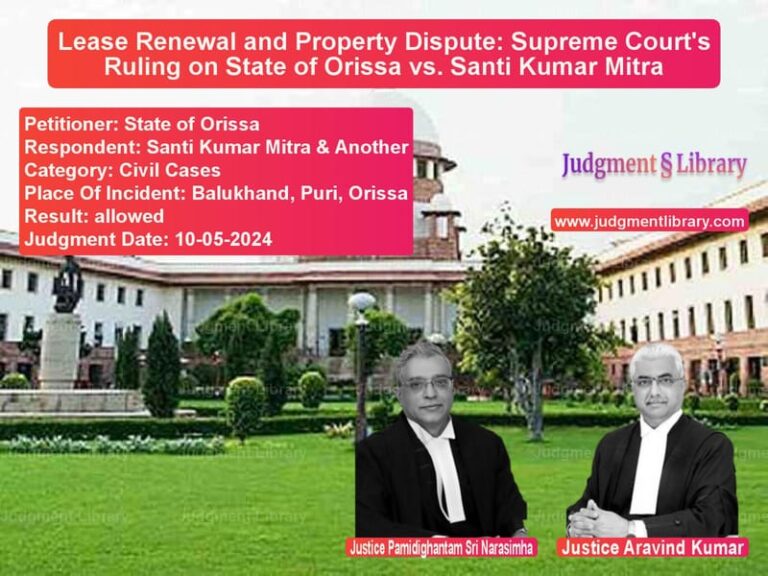Supreme Court Dismisses Appeal in Property Dispute Over Reconveyance Agreement
The Supreme Court of India recently ruled on a significant property dispute in the case of Prakash (Dead) by LR v. G. Aradhya & Others. The case centered on whether a Reconveyance Agreement executed alongside a Sale Deed constituted a mortgage by conditional sale under Section 58(c) of the Transfer of Property Act, 1882. The Court upheld the Karnataka High Court’s judgment, dismissing the appeal and ruling that the transaction was an absolute sale with an option to repurchase, not a mortgage.
Background of the Case
The dispute pertained to a property measuring 30 ft. x 60 ft. in Bangalore. The appellant’s father, Gangaramaiah, had purchased the property in the appellant’s name in 1963. However, in 1973, he sold it to one Rudramma for ₹5,000. Alongside the sale deed, an unregistered Reconveyance Agreement was executed, allowing the vendor to repurchase the property within five years by repaying the same amount.
The legal timeline was as follows:
- October 16, 1963: Gangaramaiah purchased the property in the name of the appellant.
- December 24, 1973: Gangaramaiah sold the property to Rudramma for ₹5,000.
- December 24, 1973: A separate Reconveyance Agreement was signed, allowing repurchase within five years.
- November 24, 1978: Gangaramaiah sent a legal notice to Rudramma, seeking reconveyance.
- December 2, 1978: Rudramma replied, asserting that the sale was absolute, but she was willing to transfer the property for ₹7,000.
- July 24, 1978: Rudramma filed an eviction suit against Gangaramaiah.
- March 26, 1987: Rudramma’s legal heirs sold the property to N. Shashidar.
- April 30, 1987: Gangaramaiah passed away.
- 1987: The appellant filed a suit, claiming the sale was a mortgage, seeking redemption and possession.
- 2000: The Trial Court dismissed the suit.
- 2009: The Karnataka High Court upheld the Trial Court’s decision.
- 2023: The Supreme Court dismissed the appeal.
Key Legal Issues Considered
The Supreme Court examined:
- Whether the sale deed and reconveyance agreement together constituted a mortgage by conditional sale under Section 58(c) of the Transfer of Property Act.
- Whether the suit was barred by limitation.
- Whether the reconveyance agreement created a legal obligation to return the property.
- Whether the sale was for the benefit of a minor, justifying its cancellation.
Arguments by the Appellant
The appellant contended:
- The intention behind the sale and reconveyance agreement indicated a mortgage, not an outright sale.
- The property was sold while the appellant was a minor, and the sale was without legal necessity.
- The reconveyance agreement created a binding obligation for the vendee to return the property upon repayment.
- The suit was filed within the limitation period as a redemption claim, not a mere challenge to the sale.
Arguments by the Respondents
The respondents argued:
- The sale was absolute, with no conditions for retransfer in the sale deed itself.
- The reconveyance agreement was a separate document, not forming part of the sale deed.
- The appellant’s father had received full consideration and delivered possession at the time of sale.
- The appellant failed to challenge the sale within the prescribed limitation period.
Supreme Court’s Analysis and Judgment
1. No Mortgage by Conditional Sale
The Court ruled that for a mortgage by conditional sale to exist under Section 58(c) of the Transfer of Property Act, the condition for reconveyance must be part of the sale deed itself:
“The proviso to Section 58(c) clearly states that a transaction shall not be deemed to be a mortgage unless the condition is embodied in the document which effects or purports to effect the sale.”
The Court found that the reconveyance agreement was separate and not part of the sale deed, making it a sale with an option to repurchase rather than a mortgage.
2. Limitation Bar on Claim
The Court ruled that the appellant’s suit was time-barred:
“The suit, having been filed in 1987, challenging a sale executed in 1973, is clearly barred by limitation.”
3. No Evidence of Mortgage Intent
The Court examined the wording of both documents and found:
“The transaction was an outright sale, as possession was delivered, consideration was paid in full, and there was no clause indicating a mortgage.”
4. No Obligation to Reconvey
The reconveyance agreement merely gave the vendor an option to repurchase within five years, which he failed to exercise in time.
Supreme Court’s Final Decision
The Supreme Court dismissed the appeal and upheld the Karnataka High Court’s decision:
“The appeal is dismissed. There shall be no order as to costs.”
Conclusion
This judgment clarifies:
- Mortgages by conditional sale must be part of the same document.
- Reconveyance agreements do not automatically create mortgage rights.
- Time-barred claims cannot be entertained.
- Courts will not interfere in transactions where possession and consideration were fully exchanged.
This ruling reinforces the principle that property sales must be legally structured to avoid future disputes.
Petitioner Name: Prakash (Dead) by LR.Respondent Name: G. Aradhya & Others.Judgment By: Justice Hima Kohli, Justice Rajesh Bindal.Place Of Incident: Bangalore, Karnataka.Judgment Date: 18-08-2023.
Don’t miss out on the full details! Download the complete judgment in PDF format below and gain valuable insights instantly!
Download Judgment: prakash-(dead)-by-lr-vs-g.-aradhya-&-others-supreme-court-of-india-judgment-dated-18-08-2023.pdf
Directly Download Judgment: Directly download this Judgment
See all petitions in Property Disputes
See all petitions in Judgment by Hima Kohli
See all petitions in Judgment by Rajesh Bindal
See all petitions in dismissed
See all petitions in supreme court of India judgments August 2023
See all petitions in 2023 judgments
See all posts in Civil Cases Category
See all allowed petitions in Civil Cases Category
See all Dismissed petitions in Civil Cases Category
See all partially allowed petitions in Civil Cases Category

